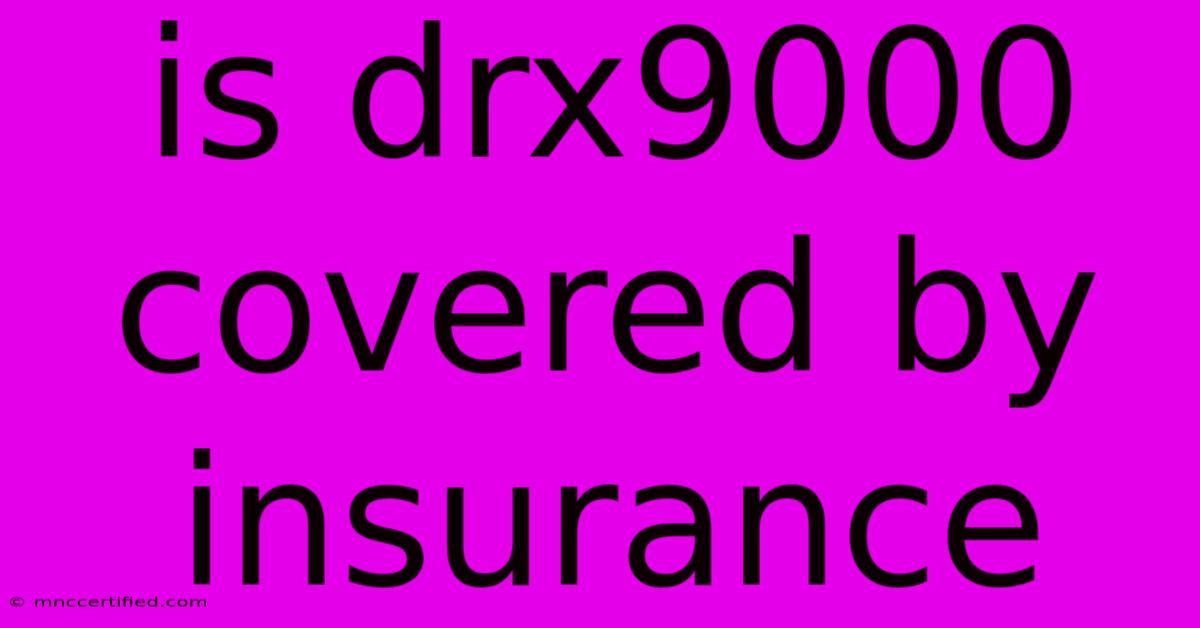Is Drx9000 Covered By Insurance

Table of Contents
Is Dr.9000 Covered by Insurance? A Comprehensive Guide
Many men seeking solutions for erectile dysfunction (ED) explore various treatment options, and Dr.9000 is often a topic of conversation. However, a critical question arises: Is Dr.9000 covered by insurance? The short answer is likely no, and this article will delve into the reasons why. Understanding this requires a nuanced look at insurance coverage for ED treatments and the nature of Dr.9000 itself.
Understanding Insurance Coverage for Erectile Dysfunction
Insurance companies generally cover ED treatments that are deemed medically necessary and align with established clinical guidelines. This usually includes:
- Prescription Medications: Drugs like Viagra (sildenafil), Cialis (tadalafil), Levitra (vardenafil), and Stendra (avanafil) are frequently covered, but only with a doctor's prescription and often after prior authorization. Coverage may depend on your specific plan and whether pre-existing conditions are involved.
- Penile Implants: In cases where other treatments have failed, surgical options like penile implants might be covered, but this requires extensive medical justification and a rigorous approval process.
- Other Therapies: Some insurance plans may cover counseling or other therapies to address underlying psychological factors contributing to ED.
Why Dr.9000 is Unlikely to Be Covered
Dr.9000, often marketed as a male enhancement device or supplement, typically falls outside the scope of medically necessary treatments covered by most insurance plans. This is because:
- Lack of FDA Approval: Many products like Dr.9000 lack FDA approval for the treatment of ED. Insurance companies prioritize treatments with proven efficacy and safety, backed by rigorous scientific studies and regulatory approval. Unproven treatments pose significant risks and are therefore not covered.
- Not Prescribed by a Doctor: Insurance coverage usually requires a prescription from a licensed medical professional. Dr.9000 is often marketed as an over-the-counter product, bypassing the crucial medical evaluation necessary for safe and appropriate treatment.
- Potential for Adverse Effects: Using unapproved products like Dr.9000 carries the risk of unknown side effects and potential drug interactions. Insurance companies aim to minimize risk and therefore avoid covering such products.
Exploring Affordable Options for ED Treatment
If you're concerned about the cost of ED treatment, consider these alternatives:
- Generic Medications: Generic versions of Viagra, Cialis, and other ED medications are often significantly cheaper than brand-name drugs.
- Negotiating with Your Insurance Provider: Contact your insurance company directly to discuss coverage options and explore potential avenues for cost reduction, such as appealing a denial or exploring alternative treatments within their formulary.
- Patient Assistance Programs: Many pharmaceutical companies offer patient assistance programs that provide financial support for eligible individuals.
- Consultation with a Healthcare Professional: A doctor can help you determine the best course of treatment based on your specific needs and medical history. This will help you make informed decisions about your health and financial resources.
Conclusion: Prioritize Your Health and Seek Professional Advice
While the allure of cheaper options is understandable, it's crucial to prioritize your health and safety. Avoid unproven treatments and always consult a medical professional before starting any new medication or therapy for ED. A doctor can accurately diagnose the underlying cause of your ED and recommend appropriate, evidence-based treatments that may or may not be covered by insurance. Remember, cost shouldn't compromise your health. Prioritize a safe and effective approach to managing your condition. Discuss your financial concerns openly with your doctor to explore various treatment options that fit your budget and medical needs.

Thank you for visiting our website wich cover about Is Drx9000 Covered By Insurance. We hope the information provided has been useful to you. Feel free to contact us if you have any questions or need further assistance. See you next time and dont miss to bookmark.
Featured Posts
-
Arsenal Defeat Nottingham Forest 3 0
Nov 24, 2024
-
Insurance For Bed And Breakfast
Nov 24, 2024
-
High Stakes F1s Vegas Win
Nov 24, 2024
-
Millwall Sunderland Clash Suspended Two Medical Emergencies
Nov 24, 2024
-
Farm Bureau Insurance Durant Ok
Nov 24, 2024